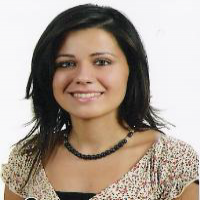Research Article
Issue Editorial Board



1. Adı Soyadı: Zeliha DEMİR KAYMAK
2. Doğum Tarihi: 20/04/1984
3. Unvanı: Dr. Öğr. Üyesi
4. Öğrenim Durumu:
Derece Alan Üniversite Yıl
Lisans Bilgisayar ve Öğretim Teknolojileri Eğitimi Sakarya Üniversitesi 2005
Y. Lisans Bilgisayar ve Öğretim Teknolojileri Eğitimi Sakarya Üniversitesi 2008
Doktora Bilgisayar ve Öğretim Teknolojileri Eğitimi Sakarya Üniversitesi 2015
5. Akademik Unvanlar:
Dr. Öğr. Üyesi Tarihi : 04/10/2016
Doçentlik Tarihi : 22/03/2024
Profesörlük Tarihi :
6. Yönetilen Yüksek Lisans ve Doktora Tezleri
6.1. Yüksek Lisans Tezleri
1 ŞULE KILINÇ 2021 Çevrimiçi öğrenmeye yönelik hazır bulunuşluk ve teknoloji ile öz-yönelimli öğrenmenin başarı, performans ve algılanan öğrenmeye etkisi
2 MEHMET ERMAN 2020 Ortaokul öğretmenlerinin teknoloji kabul düzeyleri ile Eğitim Bilişim Ağını kullanmaya yönelik öz yeterliklerinin incelenmesi
3 FUNDA NUR KİBAROĞLU 2020 Ortaokul öğrencilerinin dijital oyun bağımlılık düzeyleri ile akademik erteleme, öz yeterlik ve bilgi işlemsel düşünme düzeyleri arasındaki ilişkinin incelenmesi
4 MEHMET BAŞAR 2019 Üniversite öğrencilerinin teknoloji bağımlılık, sanal zorba ve sanal mağdur olma düzeyleri arasındaki ilişkinin incelenmesi
6.2. Doktora Tezleri
7. Yayınlar
7.1. Uluslararası hakemli dergilerde yayınlanan makaleler (SCI & SSCI & Arts and Humanities)
DEMİR KAYMAK ZELİHA,AKGÜN ÖZCAN ERKAN (2019). Effects of Cloud Computing Tools, Study Type and Task Difficulty on Cognitive Load and Performance. Malaysian Online Journal of Educational Technology, 7(4), 155-167., Doi: 10.17220/mojet.2019.04.011 (Yayın No: 5541303)
HORZUM MEHMET BARIŞ,DEMİR KAYMAK ZELİHA,CANAN GÜNGÖREN ÖZLEM (2015). Structural Equation Modeling towards Online Learning Readiness Academic Motivations and Perceived Learning. Educational Sciences: Theory & Practice, 15(3), 759-770., Doi: 10.12738/estp.2015.3.2410 (Yayın No: 2503427)
DEMİR KAYMAK ZELİHA,HORZUM MEHMET BARIŞ (2013). Çevrimiçi Öğrenme Öğrencilerinin Çevrimiçi Öğrenmeye Hazır Bulunuşluk Düzeyleri Algıladıkları Yapı ve Etkileşim Arasındaki İlişki. Educational Sciences: Theory & Practice, 13, 1783-1797., Doi: 10.12738/estp.2013.3.1580 (Yayın No: 2519888)
7.2. Uluslararası diğer hakemli dergilerde yayınlanan makaleler
KAYMAK, Z. D., GÜNGÖREN, Ö. C., Akgün, Ö. E., & KIYICI, M. (2021). Social Networking Literacy Scale: A Study of Validity and Reliability. Malaysian Online Journal of Educational Technology, 9(1), 97-107.
GÜNGÖREN, Ö. C., KAYMAK, Z. D., İŞBULAN, O., Bayram, T. O. K., SAVAŞ, F., YILDIRIM, S., ... & ÖZTÜRK, İ. Topic Trends in Educational Technology Research (2015-2020). Sakarya University Journal of Education, 11(2), 285-304.
DEMİR-KAYMAK, Z., DUMAN, İ., RANDLER, C., & HORZUM, M. B. (2022). The Effect of Gender, Grade, Time and Chronotype on Computational Thinking: Longitudinal Study. Informatics in Education.
DEMIR KAYMAK, Z., & HORZUM, M. B. (2022). STUDENT BARRIERS TO ONLINE LEARNING AS PREDICTORS OF PERCEIVED LEARNING AND ACADEMIC ACHIEVEMENT. Turkish Online Journal of Distance Education (TOJDE), 23(2).
7.3. Uluslararası bilimsel toplantılarda sunulan ve bildiri kitabında (Proceedings) basılan bildiriler
1. İşman, A. & Demir Kaymak, Z. (2013). Facebook üzerinden sunulan akademik destek faaliyetleri ile ilgili yüzyüze ve karma öğrenme öğrenci görüşlerinin karşılaştırılması. International Conference on New Horizons in Education 2013 Proceedings Book Volume 3. Rome / ITALY
2. Demir Kaymak, Z., Canan Güngören, Ö., İşman, A. & Kıyıcı, M. (2011). Uzaktan Eğitim ve Etik. XI. Uluslararası Eğitim Teknolojileri Konferansı Bildiri Kitabı, İstanbul.
3. İşman A. & Demir, Z. (2009). Uzaktan eğitim öğrencilerinin akademik güdülenme düzeyleri (SAÜ örneği). IX. Uluslararası Eğitim Teknolojileri Konferansı Bildiri Kitabı, Ankara.
4. İşman A., Demir Z., Canan Ö. & İşbulan, O. (2008). Social Barriers : A Study of Teacher Candidates of Using Technology. ED-MEDIA 2008, World Conferance on Educational Multimedia, Hypermedia & Telecommunications Proceedings Book, Page:123-128. Vienna, Austria.
5. İşman A., Canan Ö., İşbulan O., & Demir Z. (2008). Communication Barriers : A Study of Teacher Candidates of Using Technology. VIII. International Educational Technology Conference Proceedings Book, Page: 169-177. Eskişehir, Turkey
6. İşman A., İşbulan O., Demir Z. & Canan Ö. (2008). Eğitim Fakültesinde Öğrenim Gören Öğretmen Adaylarının İnternet Kullanma Bariyerleri. VIII. Uluslararası Eğitim Teknolojileri Konferansı Bildiri Kitabı, Eskişehir.
7. İşman A., İşbulan O., Demir Z. & Canan Ö. (2008). Web Siteleri Açısından Kullanılabilirlik. VIII. Uluslararası Eğitim Teknolojileri Konferansı Bildiri Kitabı, Eskişehir.
8. İşman, A., Gündüz, H. B., İşbulan, O. & Demir, Z.(2006). Eğitim Yönetimi Tezsiz Master Programında Bulunan Eğitim Yöneticisi Adayı Öğretmenlerin Teknolojiye İlişkin Tutumları."VI. Uluslararası Eğitim Teknolojileri Konferansı, Cilt 2".Doğu Akdeniz Üniversitesi, KKTC
9. İşman, A., Gündüz, H. B., İşbulan, O. & Demir, Z.(2006). Eğitim Yönetimi Tezsiz Master Programında Bulunan Eğitim Yöneticisi Adayı Öğretmenlerin Bilgisayar Kullanma Yeterlilikleri."VI. Uluslararası Eğitim Teknolojileri Konferansı, Cilt 2".Doğu Akdeniz Üniversitesi, KKTC
10. İşman, A., Gündüz, H. B., İşbulan, O. & Demir, Z.(2006). Eğitim Yönetimi Tezsiz Master Programında Bulunan Eğitim Yöneticisi Aday Öğretmenlerin İnternete Yönelik Yeterlilikleri."VI. Uluslararası Eğitim Teknolojileri Konferansı,Cilt 2".Doğu Akdeniz Üniversitesi, KKTC
11. İşman, A., Gündüz, H. B., İşbulan, O. ve Demir, Z.(2006). Eğitim Yönetimi Ve Denetimi Tezsiz Master Programında Bulunan Eğitim Yöneticisi Aday Öğretmenlerin Eğitim Teknolojilerini Kullanma Yeterlilikleri."VI. Uluslararası Eğtim Teknolojileri Konferansı,Cilt 2".Doğu Akdeniz Üniversitesi, KKTC
12. DEMİR KAYMAK ZELİHA,CANAN GÜNGÖREN ÖZLEM,HORZUM MEHMET BARIŞ (2017). ÖĞRENME YÖNETİM SİSTEMİ KABUL MODELİ ÖLÇEĞİ GEÇERLİLİK VE GÜVENİRLİK ÇALIŞMASI. ITTES 2017 (Tam Metin Bildiri/Sözlü Sunum)(Yayın No:3741944)
13. Ohlaz, H. Ve Demir Kaymak, Z. (2019). Lisansüstü Uzaktan Eğitim Öğrencilerinin Başarı Odaklı Motivasyon Düzeylerinin Çeşitli Değişkenler Açısından İncelenmesi. International Congresses on Education 2019.
14. KILINÇ, Ş., & DEMİR KAYMAK, Z. E. L. İ. H. A. (2019). Lisansüstü uzaktan eğitim öğrencilerinin çevrimiçi öğrenmeye hazır bulunuşluk düzeylerinin kişilik yapılarına göre incelenmesi. International Congresses on Education 2019.
15. Ernab, M. Ve Demir Kaymak, Z. (2019). Ortaokul Öğretmenlerinin Eğitim Bilişim Ağı (EBA) Kullanımlarına Yönelik Öz Yeterlik Algılarının İncelenmesi (Kocaeli İli Darıca İlçesi Örneği). International Congresses on Education 2019.
7.4. Yazılan uluslararası kitaplar veya kitaplarda bölümler
101 Araçla web 2.0, Bölüm adı:(Kavram Haritası ve Diyagram Araçları: Bubble.us) (2019)., DEMİR KAYMAK ZELİHA, pegem akademi, Basım sayısı:1, Sayfa Sayısı 33, ISBN:978-605-241-567-2, Türkçe(Bilimsel Kitap),
101 Araçla web 2.0, Bölüm adı:(Kavram Haritası ve Diyagram Araçları: Cacoo) (2019)., DEMİR KAYMAK ZELİHA, pegem akademi, Basım sayısı:1, Sayfa Sayısı 33, ISBN:978-605-241-567-2, Türkçe(Bilimsel Kitap),
101 Araçla web 2.0, Bölüm adı:(Kavram Haritası ve Diyagram Araçları: Popplet) (2019)., DEMİR KAYMAK ZELİHA, pegem akademi, Basım sayısı:1, Sayfa Sayısı 33, ISBN:978-605-241-567-2, Türkçe(Bilimsel Kitap),
101 Araçla web 2.0, Bölüm adı:(Kavram Haritası ve Diyagram Araçları: Mindmup) (2019)., DEMİR KAYMAK ZELİHA, pegem akademi, Basım sayısı:1, Sayfa Sayısı 33, ISBN:978-605-241-567-2, Türkçe(Bilimsel Kitap),
101 Araçla web 2.0, Bölüm adı:(Kavram Haritası ve Diyagram Araçları: Draw.io) (2019)., DEMİR KAYMAK ZELİHA, pegem akademi, Basım sayısı:1, Sayfa Sayısı 33, ISBN:978-605-241-567-2, Türkçe(Bilimsel Kitap),
101 Araçla web 2.0, Bölüm adı:(Kavram Haritası ve Diyagram Araçları: Mindomo) (2019)., DEMİR KAYMAK ZELİHA, pegem akademi, Basım sayısı:1, Sayfa Sayısı 33, ISBN:978-605-241-567-2, Türkçe(Bilimsel Kitap),
101 Araçla web 2.0, Bölüm adı:(Kavram Haritası ve Diyagram Araçları: Gliffy) (2019)., DEMİR KAYMAK ZELİHA, pegem akademi, Basım sayısı:1, Sayfa Sayısı 33, ISBN:978-605-241-567-2, Türkçe(Bilimsel Kitap),
Teknolojinin Olumsuz Etkileri, Bölüm adı:(Oyun Bağımlılığı) (2018)., HORZUM MEHMET BARIŞ,CANAN GÜNGÖREN ÖZLEM,DEMİR KAYMAK ZELİHA, Vizetek, Editör:Mehmet Barış HORZUM, Basım sayısı:4, ISBN:978-605-7523-00-6, Türkçe(Bilimsel Kitap), (Yayın No: 4621561)
Teknolojinin Olumsuz Etkileri, Bölüm adı:(Oyun Bağımlılığı) (2016)., HORZUM MEHMET BARIŞ,CANAN GÜNGÖREN ÖZLEM,DEMİR KAYMAK ZELİHA, Vize Yayıncılık, Editör:Ayas Tuncay, Horzum Mehmet Barış, Basım sayısı:1, Sayfa Sayısı 184, ISBN:978-605-9278-04-1, Türkçe(Bilimsel Kitap), (Yayın No: 3131363)
Etkinlik Örnekleriyle Güncel Öğrenme Öğretme Yaklaşımları I, Bölüm adı:(ÇEVRİMİÇİ ÖĞRENME-ÖĞRETME YAKLAŞIMI) (2014)., CANAN GÜNGÖREN ÖZLEM,DEMİR KAYMAK ZELİHA,HORZUM MEHMET BARIŞ, Pegem Akademi, Editör:Doç. Dr. Gülay Ekici, Basım sayısı:1, ISBN:978-605-318-003-6, Türkçe(Bilimsel Kitap), (Yayın No: 2503816)
7.5. Ulusal hakemli dergilerde yayınlanan makaleler
HORZUM MEHMET BARIS,DUMAN İBRAHİM, DEMIR KAYMAK ZELIHA (2020). Durumsal Duygular Ölçeğinin Türkçe Formunun Geçerlik ve Güvenirlik Çalışması. Sakarya Üniversitesi Eğitim Fakültesi Dergisi; 2020; (39); 46-59.
HORZUM MEHMET BARIŞ,DEMİR KAYMAK ZELİHA,CANAN GÜNGÖREN ÖZLEM (2017). ÇEVRİMİÇİ ÖĞRENMEDE ÖĞRENCİ ENGELLERİ ÖLÇEĞİ’NİN TÜRKÇE’YE UYARLANMASI: GEÇERLİK VE GÜVENİRLİK ÇALIŞMASI. Açıköğretim Uygulamaları ve Araştırmaları Dergisi, 3(2), 61-84.
AKGÜN ÖZCAN ERKAN,GÖKMEN ÖMER FARUK,ALBAYRAK ÖZER EBRU,DEMİR KAYMAK ZELİHA,HORZUM MEHMET BARIŞ,KIYICI MÜBİN (2015). ÖĞRETMENLİK UYGULAMASINA DESTEK VERMEK İÇİN GELİŞTİRİLECEK BİLİŞİM SİSTEMİNE YÖNELİK İHTİYAÇ ANALİZİ SONUÇLARI. EĞİTİM TEKNOLOJİSİ KURAM VE UYGULAMA, 5(2), 54-72.

Sakarya Üniversitesi Matematik Eğitimi

Cihat Atar works in Department of English Language Teaching, Faculty of Education at Sakarya University. Cihat does research in teaching English to learners with special needs, Sociolinguistic textbook analysis, WEs, EMI, Conversation Analysis, and 21st century skills. He earned his BA degree (ELT) from Boğaziçi University and his MA (TESOL and Applied Linguistics) and PhD (Educational and Applied Ling.) degrees from the University of Newcastle upon Tyne, the UK in 2012 and 2016 respectively.

Sakarya University
Aim & Scope
Sakarya University Journal of Education Faculty (SUJEF) is an academic journal that is published twice a year by Sakarya University Faculty of Education since 2001. SUJEF aims to ensure teachers, lecturers, researchers, education and school administrators, and practitioners to follow scientific developments, innovations, practices and educational research that will contribute to their improvement. Also, SUJEF enables academicians working in the field of educational sciences and teacher training to publish their manuscripts. In this scope, the journal examines the issues in education scientifically and shares the studies and examinations with academicians, teachers, and practitioners.
Sakarya University Journal of Education Faculty (SUJEF) is a peer-reviewed and scientific journal that is published twice a year. SUJEF publishes original research articles (quantitative, qualitative) in the field of education. The language of the journal is Turkish and English.
Sakarya University Journal of Education Faculty focuses on current and original research that contributes to theory and practice in areas such as,
Educational administration
Education programs and teaching
Curriculum development
Lifelong learning
Education psychology
Guidance and psychological counseling
Special education
Education mentally handicapped children
Measurement and evaluation in education
Computer education and instructional technologies
Distance education
Foreign language education
English education
Turkish education for foreigners
Turkish education
Mathematics education
Science education
Preschool education
Classroom training
Teacher training
Social studies training
Arts education.
Author Guidelines
A) General Information
1. The publication language of SUJEF is Turkish and English.
2. SUJEF is published online twice a year in June and December. Only "Original Research Articles" are published in SUJEF.
B) Spelling Rules
1. Articles to be submitted to SUJEF should be prepared by taking into account the in-text and end-of-text reference, table, and figure spelling specified in APA6 Turkish and English versions.
To access the APA6 Turkish version: https://www.tk.org.tr/APA/apa_2.pdf.
To access the APA6 English version: https://www.apastyle.org/manual
2. Articles should be edited and prepared by considering the explanations in the SUJEF template file and using the journal template.
Click here for the SUJEF Turkish article template: https://dergipark.org.tr/tr/download/journal-file/19838
Click here for the SUJEF English article template: https://dergipark.org.tr/tr/download/journal-file/20552
3. The articles submitted to the SUJEF system should not contain information about the author(s). If there is a description of the candidate study, it should be stated in the "Note to the Editor" section.
4. Main section titles (first level titles) should be written in 11 font sizes, left-justified, bold, capital letters, and numbered consecutively as in the template. Subheadings (second level headings) should be written in 11 font sizes, left-justified, bold, numbered as in the template and the first letter of each word should be capitalized. Three and lower-level headings should be left-justified, 11 font sizes, Italic, bold, and only the first letters of the words should be capitalized.
5. The article should include Turkish title, Turkish abstract, English title, English abstract, introduction, method, findings, conclusion, discussion and suggestions, refferences, and extended English abstract sections.
6. Before the references of the article, there should be Research and Publication Ethics Statement, Contribution Rates of Authors to the Article and Statement of Interest sections. If deemed necessary in the articles, the headings of Support Statement and Acknowledgment may also be included in this section.
7. The length of the article should not exceed 8000 words including the references.
8. The edits requested by the reviewers from the authors about the article are made by clicking the "Track Changes" button on the article. This file is uploaded to the system with the article tracking template. In the article tracking template, it is stated which adjustments requested by the referees were made on the article, and if not, the reasons are indicated.
Article tracking template: https://dergipark.org.tr/tr/download/journal-file/22031
Ethical Principles and Publication Policy
ETHICAL PRINCIPLES AND PUBLICATION POLICY
Publication Policy
Sakarya University Journal of Education Faculty aims to publish original, high quality and ethical academic research results produced on education-related issues at all levels and all fields of education, to contribute to the scientific knowledge unit at the national and international level, to promote the development of a more qualified and effective educational system by making the compiled academic information accessible to scientists and practitioners at the national and international level. The journal includes all academic studies on lifelong learning, teacher training, educational sciences, and field education.
The language of the journal is Turkish and English. In Turkish articles, dictionaries and the spelling guide of the Turkish Language Association should be taken into consideration and Turkish words should be used as much as possible. When using the Turkish equivalent of the concept/term in a foreign language specific to the field, the foreign language equivalent should be given in parentheses where the relevant concept/term is first used. In presenting the statistical techniques used in the article, statistical values should be included in the sentences based on APA 6 style. However, where appropriate, author(s) can use tables and figures. APA 6 style should be used in the writing of the entire article, indicating figures, tables, and references.
The article submitted for evaluation should be prepared within the framework of the article template of the journal. If the article is to be carried out in any institution or organization, it is required to obtain the ethics committee’s approval (voluntary participation form, informed consent form, scale permissions, etc.) from this institution or organization to indicate that the study will be conducted. No fee is paid to the author(s) and reviewer(s) for the articles that are evaluated and accepted for publication.
The preliminary evaluation of the article is completed in 7 days, after the preliminary evaluation, the reviewer is appointed within 7 days at the latest, the article evaluation process is completed in 60 days with the appointed reviewer evaluating the article within 30 days at the latest. The author(s) cannot make changes on the articles accepted for publication and finalized. However, the author (s) should contact the editor to inform, correct or retract when they notice the error in the evaluation and early view or electronically published article.
The journal is a national and interdisciplinary peer-reviewed online academic journal published twice a year. During the evaluation of the articles in the journal, a double-blind review system is applied. In accordance with the open access policy, the journal issues and articles are available on the journal's web page and the full texts of the articles can be accessed as pdf files.
Publication Ethics
Within the scope of SUJEF, the ethical rules that all components of the publication process, including editors, referees and authors, must comply with in the realization of scientific production have been prepared within the framework of the following;
"Code of Conduct and Best Practice Guidelines for Journal Editors" and "Short Guide to Ethical Editing for New Editors" defined by the Publication Ethics Committee (COPE),
"Golden Rules for Scholarly Journal Editors" defined by the European Association of Science Editors (EASE),
“White Paper on Promoting Integrity in Scientific Journal Publications, 2012 Update”, defined by the Council of Science Editors (CSE),
Editor(s)
Editors generally;
- should strive to meet the information needs of readers and authors.
- should ensure the continuous improvement of the journal.
- should carry out processes to improve the quality of the studies published in the journal.
- should support freedom of thought and ensure academic integrity.
- should continue business processes without compromising intellectual property rights and ethical standards.
- should indicate clarity and transparency in terms of publication in matters that require correction and explanation.
Editors in their relations with readers;
- should inform readers of who finances research or other scientific studies and whether funders have any role in the research and its publication, and if so, what it is.
- Should Ensure that all published reports and research reviews are reviewed by suitably qualified reviewers (including statistical review where appropriate)
- Should ensure that the non-peer-reviewed sections of the journals are clearly defined
- Should adopt processes that promote the accuracy, completeness and clarity of research reports, including technical
- Should ensure the arrangement and use of appropriate guidelines and checklists
- Should maintain and improve transparency policy to encourage maximum disclosure of the reference of non-research articles.
- Should inform readers of the steps taken by the journal's staff or editorial board members to ensure an objective and impartial assessment of the study.
Editors in their relations with authors;
- should make positive or negative decisions based on the importance of the study, its original value, validity, clarity of expression, and the journal's goals and objectives.
- Unless the studies that are suitable for the scope of the publication do not have serious problems, they should be taken into the pre-evaluation stage.
- should not ignore positive reviewer’ suggestions unless there is a serious problem with the article.
- New editors should not change the decisions made by the previous editor(s) regarding the article, unless there is a serious problem.
- "Blind Review and Evaluation Process" must be published and editors must prevent deviations that may occur in the defined processes.
- The authors should be provided with descriptive and informative briefing and feedback, the guideline for the authors should be prepared and kept up to date.
Editors in their relations with reviewers;
- should determine the reviewers in accordance with the subject of the study
- are obliged to provide information and guides that reviewers will need during the evaluation phase.
- has to observe whether there is a conflict of interest between the authors and reviewers
- In the context of double-blind peer review, the identity information of the reviewers should be kept confidential.
- should encourage reviewers to evaluate the manuscript in a neutral, scientific, and objective language.
- should determine practices and policies that increase the performance of reviewers
- should take the necessary steps to dynamically update the reviewer pool.
- Should avoid impolite and unscientific evaluations.
- Should ensure that the reviewer pool consists of a wide range.
Editors in their relations with the editorial board;
- must ensure that all editorial board members advance processes in accordance with editorial policies and guidelines.
- should inform editorial board members about editorial policies and keep them informed of developments.
- should ensure that editorial board members evaluate the study impartially and independently.
- should determine new editorial board members who are able to contribute and suitable.
- must submit for evaluation studies appropriate to the field of expertise of the editorial board members.
- should interact with the editorial board regularly.
- should organize meetings with the editorial board at regular intervals for the improvement of the publication policies and the journal.
The relationship between Editor and Journal Owner is based on the principle of editorial independence. In accordance with the written contract between the editors and the publisher, all decisions taken by the editors are independent of the publisher and the journal owner.
Finally the editor (s);
Quality assurance: Responsible for publishing every article published in the journal in accordance with journal publishing policies and international standards.
Protection of personal data: Editors are obliged to ensure the protection of personal data regarding the participants, subjects or images involved in the evaluated studies. Unless the express consent of the individuals participating in the study is documented, the editor(s) is responsible for refusing to work. In addition, the editor(s) is responsible for protecting the individual data of the authors, reviewers and readers.
Ethics committee, human and animal rights: the editor is obliged to ensure the protection of human and animal rights in the studies evaluated. The editor is responsible for refusing the study in cases where the ethics committee’s approval for the subjects used in the studies and the permissions for experimental research are not available.
Prevention against possible misuse and abuse: the editor is obliged to take precautions against possible misuse and abuse. In addition to conducting a meticulous and objective investigation in determining and evaluating complaints regarding this situation, it is among the editor's responsibilities to share the findings on the issue.
Ensuring the integrity of the academic publication: the editor should ensure that the judgments in the studies that contain errors, inconsistencies or misdirections are corrected quickly.
Protection of intellectual property rights: the editor is obliged to protect the intellectual property rights of all published articles and to defend the rights of the journal and author (s) in possible violations. In addition, editors are obliged to take the necessary preventions to ensure that the content in all published articles does not violate the intellectual property rights of other publications.
Constructivism and openness to debate: the editor should take into account the persuasive criticism of the works published in the journal and take a constructive attitude towards these criticisms. the editor should give the author (s) the right to reply to the criticized studies. the editor should not ignore or exclude studies with negative results.
Complaints: Editor is obliged to carefully examine complaints from authors, reviewers or readers and respond in an enlightening and descriptive manner.
Political and Commercial concerns: Journal owner, publisher, and any other political and commercial aspects do not affect the independent decision-making of the editors.
Conflicts of Interest: The editor guarantees that the publishing process of the studies is completed in an independent and impartial manner, taking into account the conflicts of interest between the author (s), reviewers and other editors.
Reviewer(s)
- Reviewers are obliged to evaluate the submitted articles within the scope of the evaluation form for the reviewers within 15 days and prepare a report and submit the report to the editor-in-chief or section editor who directed the article.
- Reviewers should act with the awareness that they are the main determinants of the academic quality of the article to be published in the journal and make an objective and restrained evaluation with the responsibility of increasing academic quality.
- Reviewers should make the assessment objectively only in relation to the content of the study. Reviewers should evaluate manuscript regardless of ethnicity, religious, political and economic interests.
- Reviewers should avoid superficial and ambiguous statements in evaluation reports. In evaluations with negative results, the missing and defective points on which the result is based should be indicated concretely. They should make their comments in constructive and courteous wording.
- If the reviewer does not feel qualified about the subject of the article or if it does not seem possible to provide timely feedback, reviewer should inform the editor of this situation and ask him/her not to involve him/herself in the review process.
- Reviewers are obliged to keep the details of the manuscript and the evaluation process confidential even after the article evaluation process is over. Reviewers should not share the information in the article they have been assigned to review before it is published, without the explicit permission of the author.
- If the reviewers have conflicts of interest with the authors and/or financial supporters of the research, if they notice copyright infringement and plagiarism, if there is any violation of blind refereeing, they are obliged to notify the editor.
Authors
- Articles submitted to the journal for evaluation should not have been published elsewhere before
- Articles submitted to the journal for evaluation should not be evaluated in another academic journal at the same time.
- For the article sent for evaluation, the originality report must be sent with the article. The similarity index in the originality report should be below 15%.
- For the article submitted for evaluation, the authors must have a research and publication ethics statement that there are no unethical factors such as plagiarism, duplication, fraud authorship/denied authorship, research/data fabrication, article salamization, and salamization publication. For review articles, the ethical declaration given at the link can be used. https://dergipark.org.tr/tr/download/journal-file/20553
- In the articles submitted for evaluation, it is obligatory that the authors have a statement regarding their contribution to the article. For articles with a single author, the information that the author has prepared the article alone should be included, and information on the individual contribution rates of all authors should be included in articles with multiple authors.
- For the article sent for evaluation, it is required to include information such as the name of the institution or organization and the project number if it is supported by an institution or organization.
- For the article sent for evaluation, the authors can give information about the person or institutions they want to thank and thank them.
- For the article sent for evaluation, authors' statements regarding the conflict of interest are required.
- For the articles accepted for publication, the assignment of the copyright statement must be submitted by the author(s) in pdf format with a wet signature. The journal has the right to publish all articles accepted for publication.
- If the article submits for evaluation will be carried out in any institution or organization, it is required to obtain the approval of the ethics committee from this institution or organization regarding the study will be done.
- The content of the articles (the accuracy of the references and citations, the opinions put forward, and the copyrighted charts, pictures, and other visuals) published in the journal is the responsibility of the author (s).
- The author (s) cannot make changes on the articles accepted for publication and finalized.
- According to ULAKBİM TR Index rules, the ORCID numbers of all the authors in the articles must be added to the final form of the article.
Price Policy
Sakarya University Journal of Education Faculty does not charge any fee from the authors in the articles' evaluation and publication process, and all the completed content was applied free of charge to the readers.
This work is licensed under a Creative Commons Attribution-NonCommercial 4.0 International License.








